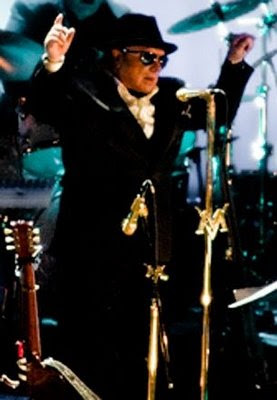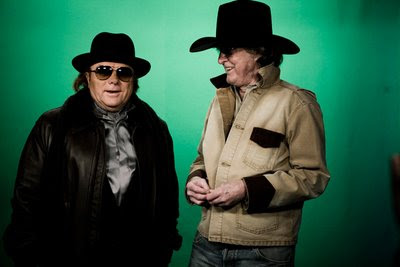 WFUV:
WFUV:
Van Morrison played two sensational sets at the Wamu Theater last night in the second of two nights at the 5600 person capacity MSG venue. Van put together a crowd pleasing song list for the first set that many fans have been waiting his whole career to hear. It could only be characterized as a ‘greatest hits’ set and which varied from the ones he played in November at the Hollywood Bowl. He was in great voice and played sax, guitar, and harp on top of leading a 14 piece band (2 cellos, 2 violins, gtr, bass, sax, trumpet, pedal steel, 3 backup singers, drums, and keyboards/flute) with hand gestures and occasional verbal commands. The Astral Weeks set was glorious. He changed the order of songs slightly by moving Slim Slow Slider towards the beginning and ending with Madame George which was indicative of his attitude toward the material. It’s his so he enhanced and accentuated what he felt like while bringing the seminal album to life.
No Depression:
Van Morrison relishes being a musical enigma. There is no other way to explain Saturday night's once-in-a-lifetime concert at the FailedBank Theater at Madison Square Garden in New York City.
The show was billed as one of a handful where Morrison would perform, in its entirety, his brilliantly abstract 1968 masterpiece Astral Weeks – an album that, for many reasons, including lingering legal tangles, never enjoyed a fitful tour when it was released. (Last year's shows in Los Angeles were recorded for the CD release Astral Weeks Live At The Hollywood Bowl, which came out this past week, and for an upcoming DVD.) Though in recent years a few tunes from the critically beloved album have found their way into Morrison's live sets, he has largely stayed away from most of the material in concert. So, there was a heightened sense of wonder and expectation.
But Morrison also promised a second set of songs he rarely performs live. The details here, as usual, were shadowy. Most who have seen Morrison live in the past expected this meant deep tracks from revered but largely forgotten collections. While he partially delivered that on this night, he also reached back for a stunningly rare onslaught of his tier-one hits in the first half of the nearly two-and-a-half-hour concert.
Starting the first set at the piano, Morrison – backed by an elegant fourteen-piece band with horns, strings, and three backing vocalists – launched into "Northern Muse (Solid Ground)" and moved to center stage midway through the song. The lovely midtempo ballad, along with other selections such as "Queen Of The Slipstream", "Spirit" and "The Healing Has Begun", showed spiritual and pastoral sides of Morrison that didn't tip the hand of what was to come.
A few songs later, Morrison (who played guitar, piano, sax and harmonica at various points during the show) dipped into a schmaltzy version of "Moondance" that was the biggest disappointment of the otherwise perfect night. The song started a string of his biggest hits, including "Wild Night", "Jackie Wilson Said", "And It Stoned Me", "Domino" and "Brown-Eyed Girl". This was the kind of single-fat set that less-vested Morrison concertgoers had been seeking for all these years, only to go home disappointed; but on this night, Morrison appeared to be enjoying himself and soaking in the appreciative crowd's roaring approval. A renowned musical deconstructionist, Morrison even delivered good chunks of the original melody lines from those signature songs intact.
After a ten-minute intermission, a slightly revamped and smaller band took the stage to tackle Astral Weeks – sort of like the main course being served after the dessert. From the initial acoustic-guitar notes of the opening title track, it was instantly clear this was going to be something special.
Aided largely by original Astral Weeks session player Jay Berliner's classical guitar romps, Morrison and band attacked the songs with a palpable joy, and a zest that dusted off these 40-year-old songs and made them shine anew. While original session double bassist Richard Davis was somewhat missed, this dynamic band with a powerfully voiced Morrison captivated the sellout crowd of 5,600, who paid between $90 and $350 to witness the spectacle.
There is something transcendent about a songwriter revisiting lyrics he wrote as a young man and interpreting them through a matured yet not cynical voice. The whimsy may have been gone, but the wonder was not. The title track, "Ballerina" and "Cypress Avenue" captured the curious spirit of the soaring original versions, while Morrison and band took liberties, including stretched-out violin and viola parts from the creative Tony Fitzgibbon, that significantly elevated the songs. Morrison, now 63, was in good spirits most of the night; guitar malfunctions and other small technical glitches did not throw him off.
On "Cypress Avenue", a playful Morrison exaggerated his class-jumping tongue-tiedness as he spied his rainbow-ribboned lady returning to her mansion. In the middle of other tunes, Morrison used an Elmer Fudd-like laugh as a vocal scat, which appeared to be an inside joke among the band. He even stopped songs to laugh a few times during the night.
Other numbers from Astral Weeks took on a new, weightier dimension. On "Slim Slow Slider", rather than stopping at the lyrics that talk about the title character dying, Morrison extended it to chronicle his own breaking down. There were other poignant moments which documented the inevitable march of aging. When Morrison sang about how he will "never grow so old again" (in "Sweet Thing"), or how he and his lover sat on a star and "dreamed of the way that we were and the way that we wanted to be" (in "The Way Young Lovers Do"), the naive innocence of an earlier time gave way to a knowing bemusement that comes with experience.
"Madame George", one of the most puzzling and lyrically debated songs from Morrison' s expansive oeuvre, closed the set of songs from the rich and timeless album. This night's rendition was far more celebratory than the album version, which painted a sadder, lonelier picture of the blurry title character. As Morrison sang over and over about "the love that loves to love the loves," it became a jocund, vivacious nursery rhyme. Further, rather than being focused on the meandering goodbye, the song was more colored by nostalgia, with Morrison recalling the back streets of his former home in Belfast. As he riffed repeatedly on the phrase "in the back street," Morrison cheerfully ad-libbed, "That's where I come from." It represented a figurative and a musical homecoming that was both memorable and touching.
An obviously engaged Morrison came back out one last time to play a hymn-like version of "Listen To The Lion" and a raucously imperfect "Gloria" to cap the amazing night of music.
-Scott Brodeur
Setlist:
Set One:
Northern Muse
Spirit
Moondance
Wild Night
Jackie Wilson Said
Baby Please Don’t Go
I Can’t Stop Lovin’ You
And it Stoned Me
Comfortably Numb
Queen of the Slipstream
And the Healing has Begun
Domino
Brown Eyed Girl
Common One
Set Two:
Astral Weeks
Beside You
Slim Slow Slider
Sweet Thing
Cyprus Avenue
The Way Young Lovers Do
Ballerina
Madame George
Listen to the Lion
Mystic Eyes>Gloria
Big Hand For The Band(s)!
Tony Fitzgibbon
Bobby Ruggiero
Sarah Jory
Jay Berliner
Paul Moran
Liam Bradley
Richie Buckley
Bianca Thornton
David Hayes
John Platania
Terry Adams
Nancy Ellis
Rick Schlosser
Pauline Lozano
 "I didn't perform (Brown Eyed Girl) for a long time because for me it was like a throwaway song. I've got about 300 other songs I think are better than that."
"I didn't perform (Brown Eyed Girl) for a long time because for me it was like a throwaway song. I've got about 300 other songs I think are better than that."



































































































































